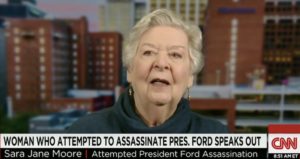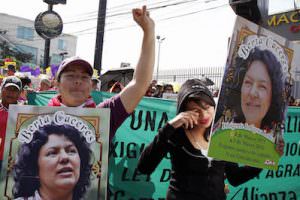Truthdigger of the Week: Mexico’s Gisela Mota
She had worked for change in the country since the age of 12, when she began attending political rallies. But she served only one day of her term as mayor of Temixco before being gunned down by a drug gang. Gisela Mota at her swearing-in ceremony as mayor of Temixco, Mexico, on New Year's Day. (Tony Rivera / AP)
Gisela Mota at her swearing-in ceremony as mayor of Temixco, Mexico, on New Year's Day. (Tony Rivera / AP)
Every week the Truthdig editorial staff selects a Truthdigger of the Week, a group or person worthy of recognition for speaking truth to power, breaking the story or blowing the whistle. It is not a lifetime achievement award. Rather, we’re looking for newsmakers whose actions in a given week are worth celebrating.
If our unhealthy appetite for the drug war—fed by a recent proliferation of films, books and TV miniseries like “Sicario” and “Narcos”—is anything to go by, then the media frenzy surrounding the recapture of Joaquín “El Chapo” Guzmán, the head of Mexico’s Sinaloa cartel, will no doubt add to the billionaire criminal’s near-mythical status. Complete with a bizarre Hollywood plotline involving actor-cum-gonzo-journalist Sean Penn (who has since admitted to regretting the encounter), El Chapo’s downfall, like that of Colombian drug lord Pablo Escobar, was ultimately fueled by his own hubris.
But earlier this month, a very different and tragically all-too-familiar story served as a reminder of the real toll of Mexico’s drug business.
On New Year’s Day, just before midnight, 33-year-old Gisela Mota returned home at the end of her first day as the first female mayor of her hometown of Temixco in Morelos. She had just given her maiden speech at the town hall, where, in a vow to root out political corruption, she quoted the leftist Uruguayan writer Eduardo Galeano.
Mota “met with her new cabinet, then ate a late dinner before returning home exhausted. She went straight to bed, but her proud family stayed up late, talking about her historic achievement,” The Guardian reports.
An armed gang approached her parents’ house, and as members of her family prepared a bottle for her newborn nephew, the assassins smashed the door open. “They said, ‘We’ve been sent here with an order to kill; which one is she?’ ” Mota’s mother told The Guardian. “I thought they’d come to kidnap her, so I was thinking how we’d pay the ransom.” After she identified herself, Mota was reportedly dragged face down and shot at least four times, just meters away from where the baby lay in his cot.
Now Mota is part of a list of public officials—including almost 100 mayors—who have been killed since the escalation of the country’s war on drugs, which in recent years has claimed more lives than the combined number of civilian deaths in Afghanistan and Iraq for the same period. In July the Mexican government released new data showing that between 2007 and 2014 more than 164,000 people were victims of homicide in Mexico. According to a “Frontline” report, “nearly 20,000 died [in 2014] alone, a substantial number, but still a decrease from the 27,000 killed at the peak of fighting in 2011.”
Not all the homicides can be linked directly to the drug war, but these staggering figures reveal how the war is evolving far beyond the drug trade in Mexico, where cartels now fight for political power. After arresting two of the men suspected of killing Mota, the police blamed her murder on a regional campaign by the Los Rojos drug gang to control town halls and steal local resources.
With a population of just 1.9 million people, the state of Morelos has the fourth highest murder rate in the country, behind only Sinaloa, Guerrero and Chiapas. It ranks in the top two for kidnappings, extortion and rape, according to the nongovernmental organization Citizen Council for Security and Criminal Justice. In recent years Morelos has become a battleground for two rival criminal gangs, Los Rojos and Guerreros Unidos, which emerged from the powerful Beltrán-Leyva cartel after its leader was killed in the state capital, Cuernavaca, in 2009. Both groups are implicated in one of Mexico’s most notorious recent crimes: the 2014 “disappearance” of 43 trainee teachers from Iguala, 60 miles southwest of Temixco.
Morelos’ state governor, Graco Ramírez, told the press that Mota’s assasination was a clear warning to local officials to not accept unified state control of police forces, a new system aimed at tackling corruption in local police forces. In a January news conference, Ramírez revealed that Los Rojos had threatened 13 other Morelos mayors in recent months. Instead of the old method of handing out bribes, Mexico’s criminal gangs are making the mayors pay them. “Politics,” explains The New York Times, “is not just a way to help their criminal businesses; it is a business in itself. And as they take control of these politicians, the cartels transform themselves into an ominous shadow power, using the tools of the state to affect anyone who lives or works in its jurisdiction.”
“Since Gisela was a child, she wanted to get into politics, to change things,” Mota’s mother said after her daughter’s death. Although she was aware that the idealistic young politician may have made herself a target, her mother said, “I had never imagined that something like this could happen.” She added, “I hope there is justice. Or we will have to take actions to demand that justice is done and the case is cleared up.”
Mota, who started attending political rallies and protests at the age of 12, decided to pursue a career in politics after studying law at university. Focusing on gender equality and environmental issues while holding important party positions at local and national levels, she was elected as a national deputy in the country’s lower chamber in 2012. “Gisela wanted to do things differently, and that can obviously generate a reaction in those accustomed to corruption,” said Anastasio Solís, her former campaign manager.
In her hope of helping to build a new Mexico, Gisela Mota paid with her life. She is our Truthdigger of the Week.
Your support matters…Independent journalism is under threat and overshadowed by heavily funded mainstream media.
You can help level the playing field. Become a member.
Your tax-deductible contribution keeps us digging beneath the headlines to give you thought-provoking, investigative reporting and analysis that unearths what's really happening- without compromise.
Give today to support our courageous, independent journalists.





You need to be a supporter to comment.
There are currently no responses to this article.
Be the first to respond.